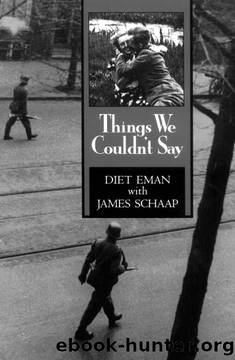Things We Couldn't Say by Diet Eman;James Schaap

Author:Diet Eman;James Schaap
Language: eng
Format: epub
Published: 2008-07-12T23:24:00+00:00
The Prison at Scheveningen
Illustration by A. van den Heuvcl from G. P. Weber, Gedenkboek van bet Orator Hotel [947) ⢠(Amsterdam: Uitgc%crij H. Nclissen.
when I first arrived at the Scheveningen prison, I had to stand with my face to the wall, all cells behind me. I was horribly frightened to be inside a prison where I knew cruel things had happened. When the guards stepped out for a minute, I could hear voices: "What's the latest news on the outside?" "Have you heard the BBC?" "What does Radio Orange say?" I wanted to tell them what I knew, but I was standing very close to the German offices, and I thought the voices might be the Gestapo and not real prisoners. If I were to tell them the latest news, it would be clear that I listened to the BBC. I didn't know who it was who wanted to know; so I didn't say a thing.
Then I was ordered to undress, and they searched me, straight up and bent over. Thank God, I had got rid of everything. Then I was sent to cell 306 in the A-corridor, where I was the fifth prisoner in a one-person cell, three meters long and two meters wide. I don't remember all the names of the other four prisoners who were there that first night; but there was only one bunk, a hard bed in the back with a thin mattress, and an old Jewish lady was lying on it. She was in her seventies, and her name was Mrs. Speier.
One of the prisoners, Lies Karel, was a nurse who had done a lot of good Resistance work before she was arrested. I eventually grew to trust her, though at the very beginning I trusted no one. I had heard that there would be informers, and there were criminals in the prison too, not just political prisoners. We were a strange mix. The Jewish lady was there simply because she was Jewish; Lies the nurse was a political prisoner; I was there because of my false identification. Another prisoner, a young girl, had been arrested with her boyfriend, a black marketeer and therefore despised by the Germans, who wanted all the Dutch money they could get for themselves.
Every Tuesday and Thursday night, Jews were sent from the prison at Scheveningen to a concentration camp in Westerbork, where they were kept before they were shipped to Germany or Poland. If Jewish families or children were caught in hiding, the Germans brought them to Scheveningen - fathers, mothers, and little children - before shipping them out to a concentration camp. On the nights the guards brought Jews in, we always heard the children crying all through that place. It was bad enough for us to have to suffer through a place like Scheveningen, but it was terrible to hear those poor, innocent children crying.
At Scheveningen our only light other than a small lamp was the daylight that came in through a very small window up high toward the ceiling.
Download
This site does not store any files on its server. We only index and link to content provided by other sites. Please contact the content providers to delete copyright contents if any and email us, we'll remove relevant links or contents immediately.
Resisting Happiness by Matthew Kelly(3176)
The Social Psychology of Inequality by Unknown(2723)
Designing Your Life by Bill Burnett(2580)
Day by Elie Wiesel(2560)
The Giving Tree by Shel Silverstein(2146)
Angels of God: The Bible, the Church and the Heavenly Hosts by Mike Aquilina(1858)
Human Design by Chetan Parkyn(1826)
The Supreme Gift by Paulo Coelho(1736)
Jesus of Nazareth by Joseph Ratzinger(1686)
Augustine: Conversions to Confessions by Robin Lane Fox(1671)
Hostage to the Devil by Malachi Martin(1642)
7 Secrets of Divine Mercy by Vinny Flynn(1598)
Dark Mysteries of the Vatican by H. Paul Jeffers(1583)
The Vatican Pimpernel by Brian Fleming(1561)
St. Thomas Aquinas by G. K. Chesterton(1534)
Saints & Angels by Doreen Virtue(1510)
My Daily Catholic Bible, NABRE by Thigpen Edited by Dr. Paul(1399)
Called to Life by Jacques Philippe(1389)
The Ratline by Philippe Sands(1388)
